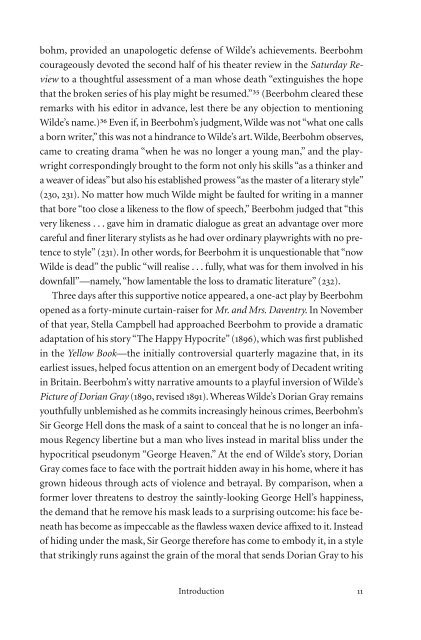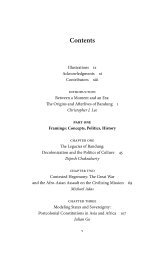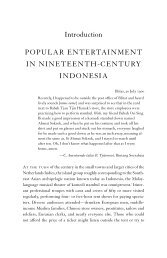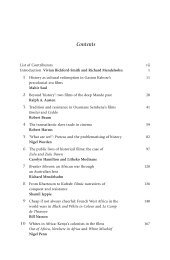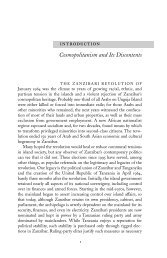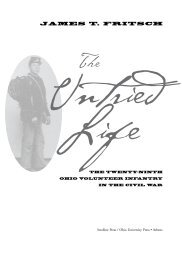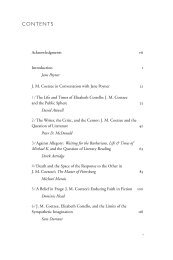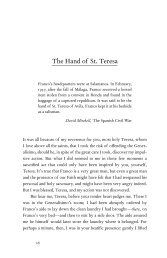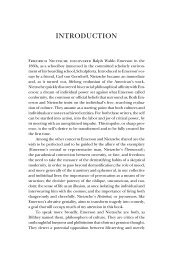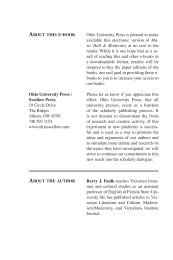Oscar Wilde and Modern Culture - Ohio University Press & Swallow ...
Oscar Wilde and Modern Culture - Ohio University Press & Swallow ...
Oscar Wilde and Modern Culture - Ohio University Press & Swallow ...
Create successful ePaper yourself
Turn your PDF publications into a flip-book with our unique Google optimized e-Paper software.
ohm, provided an unapologetic defense of <strong>Wilde</strong>’s achievements. Beerbohm<br />
courageously devoted the second half of his theater review in the Saturday Review<br />
to a thoughtful assessment of a man whose death “extinguishes the hope<br />
that the broken series of his play might be resumed.”³₅ (Beerbohm cleared these<br />
remarks with his editor in advance, lest there be any objection to mentioning<br />
<strong>Wilde</strong>’s name.)³₆ Even if, in Beerbohm’s judgment, <strong>Wilde</strong> was not “what one calls<br />
a born writer,” this was not a hindrance to <strong>Wilde</strong>’s art. <strong>Wilde</strong>, Beerbohm observes,<br />
came to creating drama “when he was no longer a young man,” <strong>and</strong> the playwright<br />
correspondingly brought to the form not only his skills “as a thinker <strong>and</strong><br />
a weaver of ideas” but also his established prowess “as the master of a literary style”<br />
(230, 231). No matter how much <strong>Wilde</strong> might be faulted for writing in a manner<br />
that bore “too close a likeness to the flow of speech,” Beerbohm judged that “this<br />
very likeness . . . gave him in dramatic dialogue as great an advantage over more<br />
careful <strong>and</strong> finer literary stylists as he had over ordinary playwrights with no pretence<br />
to style” (231). In other words, for Beerbohm it is unquestionable that “now<br />
<strong>Wilde</strong> is dead” the public “will realise . . . fully, what was for them involved in his<br />
downfall”—namely, “how lamentable the loss to dramatic literature” (232).<br />
Three days after this supportive notice appeared, a one-act play by Beerbohm<br />
opened as a forty-minute curtain-raiser for Mr. <strong>and</strong> Mrs. Daventry. In November<br />
of that year, Stella Campbell had approached Beerbohm to provide a dramatic<br />
adaptation of his story “The Happy Hypocrite” (1896), which was first published<br />
in the Yellow Book—the initially controversial quarterly magazine that, in its<br />
earliest issues, helped focus attention on an emergent body of Decadent writing<br />
in Britain. Beerbohm’s witty narrative amounts to a playful inversion of <strong>Wilde</strong>’s<br />
Picture of Dorian Gray (1890, revised 1891). Whereas <strong>Wilde</strong>’s Dorian Gray remains<br />
youthfully unblemished as he commits increasingly heinous crimes, Beerbohm’s<br />
Sir George Hell dons the mask of a saint to conceal that he is no longer an infamous<br />
Regency libertine but a man who lives instead in marital bliss under the<br />
hypocritical pseudonym “George Heaven.” At the end of <strong>Wilde</strong>’s story, Dorian<br />
Gray comes face to face with the portrait hidden away in his home, where it has<br />
grown hideous through acts of violence <strong>and</strong> betrayal. By comparison, when a<br />
former lover threatens to destroy the saintly-looking George Hell’s happiness,<br />
the dem<strong>and</strong> that he remove his mask leads to a surprising outcome: his face beneath<br />
has become as impeccable as the flawless waxen device affixed to it. Instead<br />
of hiding under the mask, Sir George therefore has come to embody it, in a style<br />
that strikingly runs against the grain of the moral that sends Dorian Gray to his<br />
Introduction 11


